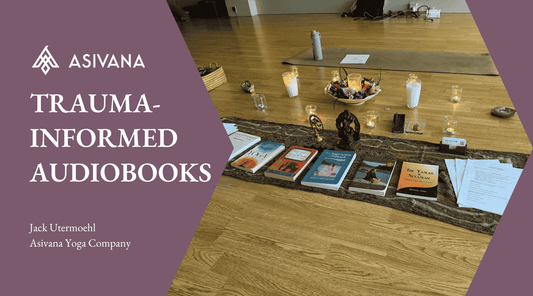Share

Yoga Philosophy and Lineage Audiobooks
Jack UtermoehlShare
Yoga is more than stretching. It’s a living philosophy. These texts illuminate the ethical foundations and spiritual teachings that guide the practice, helping you cultivate inner wisdom and connect to a lineage that spans centuries.
Why These Books Matter
Diving into yoga philosophy invites you to explore the roots of the practice beyond postures. Studying concepts like duty, devotion and ethical living nurtures svadhyaya (self‑study) and offers a compass for daily life. These works remind us that yoga is a path toward unity, compassion and liberation.
Our Recommended Books
The Yoga Sutras of Patanjali by Swami Satchidananda
Best for: Students and teachers seeking a foundational text on yoga philosophy and meditation.
This translation and commentary bring Patanjali’s ancient aphorisms into clear, modern language. Satchidananda explains how controlling the fluctuations of the mind leads to inner peace, and he offers practical advice for integrating the eight limbs into everyday life. Reading this text slowly invites contemplation and inspires disciplined practice.
Why we’re including it: It is the essential manual for understanding the philosophical and meditative roots of yoga.
The Bhagavad Gita: A Walkthrough for Westerners by Krishna‑Dwaipayana Vyasa
Best for: Practitioners who want to understand the spiritual context of yoga and apply timeless teachings to modern dilemmas.
This accessible guide unpacks the famous conversation between Prince Arjuna and his charioteer Krishna. Through stories and analogies, it explores themes of duty, right action, devotion and the nature of the self. The commentary speaks directly to contemporary readers, offering insights that can be applied to work, relationships and personal growth.
Why we’re including it: It presents profound spiritual wisdom in a relatable way, making an ancient scripture inviting and practical.
The Yamas & Niyamas: Exploring Yoga’s Ethical Practice by Deborah Adele
Best for: Anyone wishing to cultivate integrity, compassion and self‑discipline on and off the mat.
Adele brings the first two limbs of yoga to life with stories, reflections and journaling prompts. She explains how non‑violence, truthfulness and other principles can guide everyday decisions and relationships. By inviting you to reflect and practice, this book makes the ethical teachings accessible and transformative.
Why we’re including it: It helps practitioners move beyond postures into conscious living, grounding ethics in daily practice.
Eastern Body, Western Mind by Anodea Judith
Best for: Readers interested in bridging Eastern spirituality and modern therapeutic frameworks.
Judith weaves the chakra system with Western psychology, offering a detailed map of human development and healing. Each chapter explores one chakra alongside developmental stages, patterns and exercises for transformation. It’s an insightful resource for therapists, teachers and seekers who want a holistic view of mind‑body integration.
Why we’re including it: It contextualizes yogic wisdom within contemporary psychology, inviting deeper self‑discovery and healing.
How to Use These Resources in Your Practice
Take your time with these texts. Read a few sutras or verses each day, then sit quietly to reflect. Journal about how the concepts show up in your life and consider discussing them with a teacher or trusted friend. Allow the teachings to influence your choices, whether on the mat, at work or with family, and notice how philosophy becomes lived wisdom.
Affiliate disclosure: Asivana Yoga may earn a small commission from purchases made through the links above. This supports our ability to continue creating resources for students, teachers, and community spaces.










